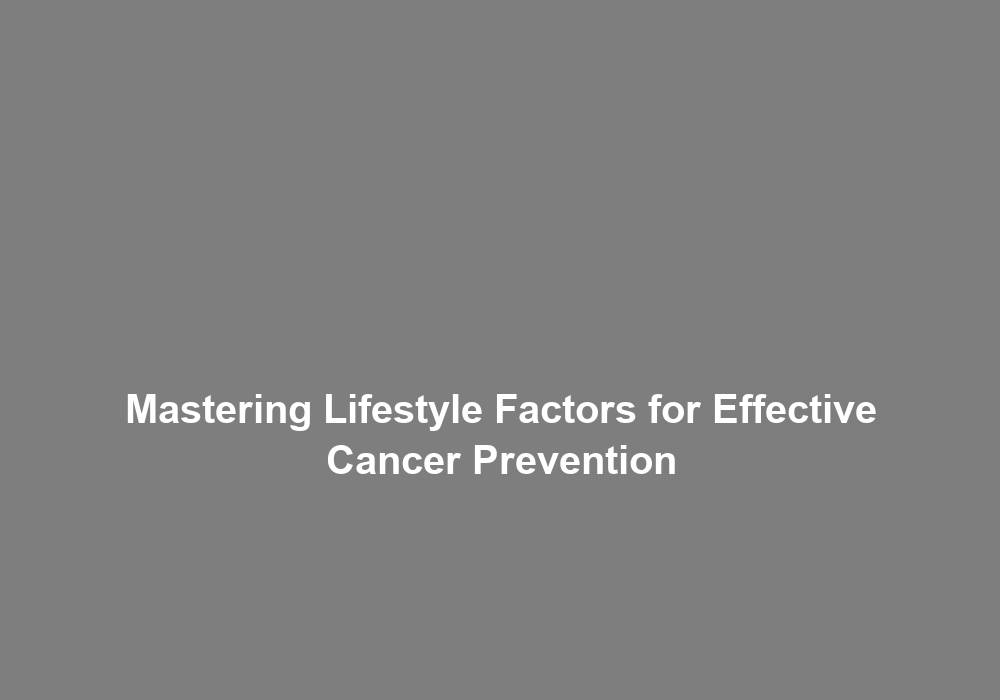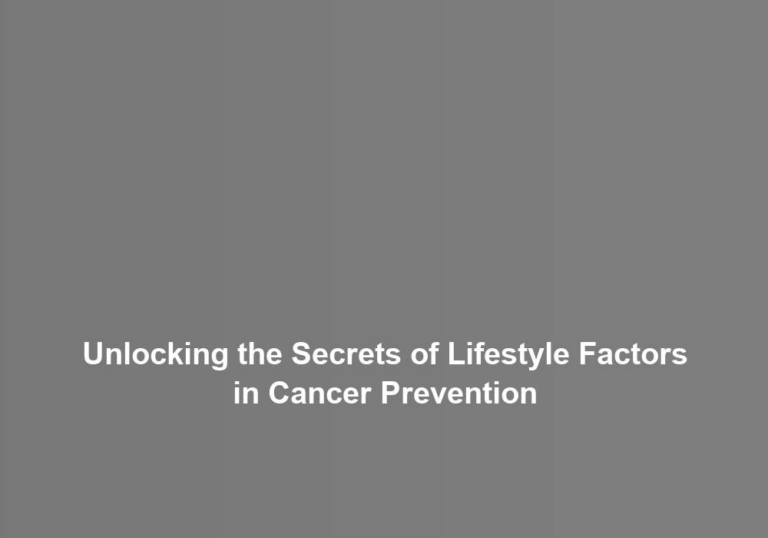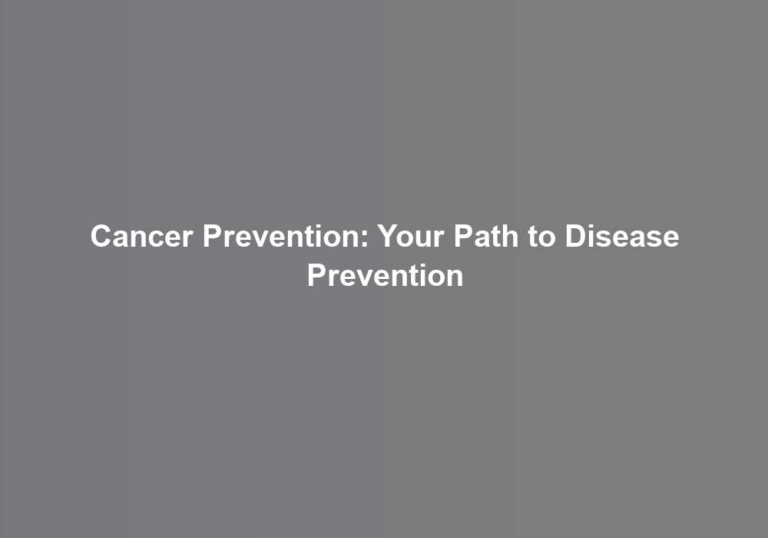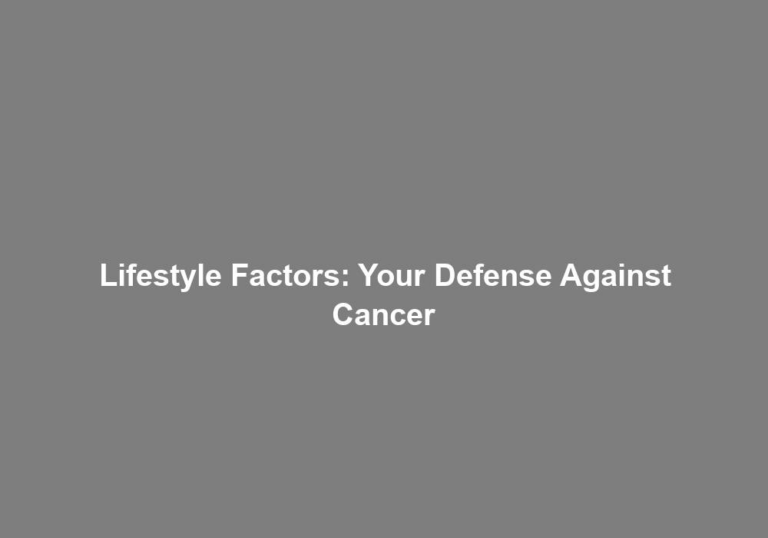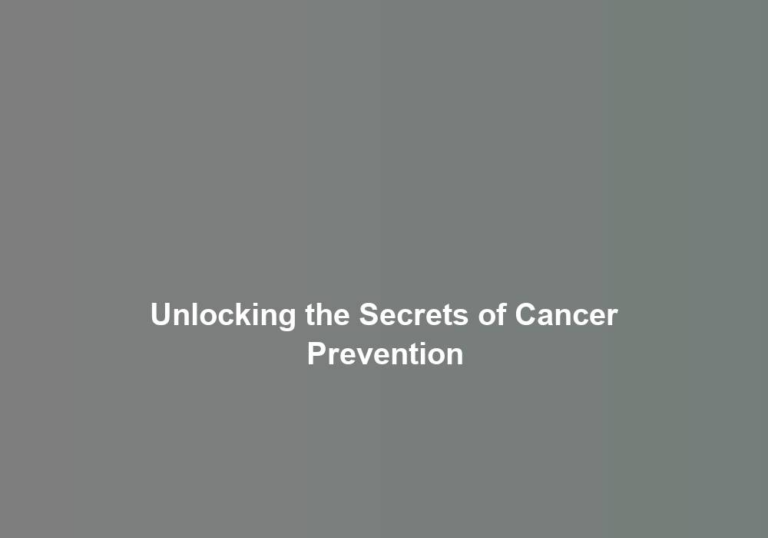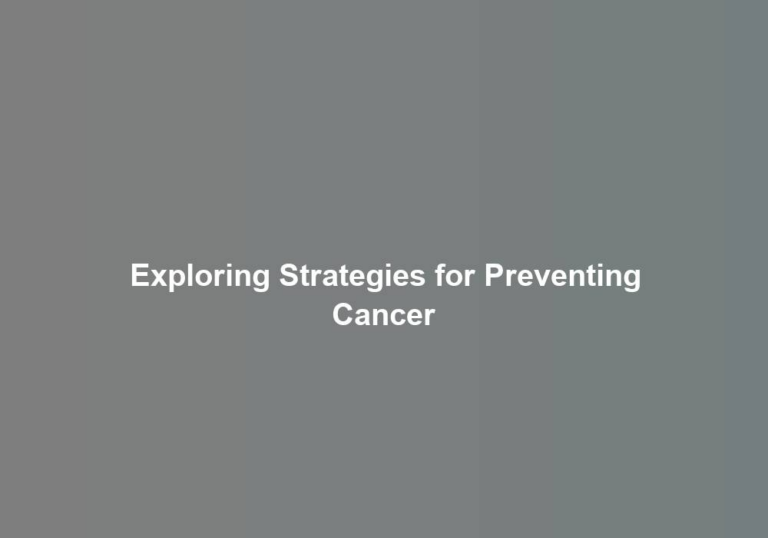Mastering Lifestyle Factors for Effective Cancer Prevention
You may not realize it, but your daily habits and lifestyle choices play a significant role in your risk of developing cancer. From the foods you eat to the amount of physical activity you engage in, every decision you make can either contribute to or reduce your risk of cancer. Understanding how lifestyle factors impact cancer risk is crucial for making informed choices that can help protect your health. If youG??re curious about the practical steps you can take to minimize your risk of cancer, there are several key lifestyle factors that you should consider.
Understanding Cancer Risk Factors
Understanding cancer risk factors is crucial for making informed decisions about lifestyle choices and preventative measures. Genetic predisposition and environmental factors play significant roles in determining an individualG??s susceptibility to developing cancer. While genetic predisposition refers to the hereditary influence on cancer development, environmental factors encompass a wide range of influences, such as exposure to carcinogens, diet, and lifestyle choices.
Genetic predisposition can significantly impact an individualG??s likelihood of developing certain types of cancer. Family history of cancer, especially in first-degree relatives, can indicate an increased risk due to inherited genetic mutations. It is essential to be aware of your familyG??s medical history and discuss it with your healthcare provider to understand your potential genetic predisposition to specific cancers. Genetic counseling and testing can provide valuable information to assess and manage this risk effectively.
On the other hand, environmental factors encompass various elements in our surroundings that can contribute to cancer development. These factors include exposure to tobacco smoke, ultraviolet radiation, air pollution, and certain chemicals. Additionally, dietary choices, physical activity levels, and exposure to infections also fall under environmental influences. Understanding how these factors can impact cancer risk empowers individuals to make informed decisions about their lifestyle and surroundings.
Importance of a Healthy Diet
You can take proactive steps to reduce your risk of cancer by focusing on the importance of a healthy diet. Nutrient-rich foods and following dietary guidelines can play a significant role in supporting your overall health and well-being. By making informed choices about what you eat, you can empower yourself in the fight against cancer.
Nutrient-Rich Foods
Eating a diverse range of nutrient-rich foods is essential for maintaining a healthy diet and supporting overall well-being. Meal planning and achieving nutritional balance are crucial aspects of incorporating these foods into your daily routine. By focusing on nutrient-dense options, you can optimize your diet to reduce the risk of cancer and other chronic diseases. Include a variety of fruits, vegetables, lean proteins, whole grains, and healthy fats in your meals to ensure youG??re getting a wide range of essential nutrients. Below is a simple guide to help you identify some nutrient-rich foods to include in your diet:
| Food Group | Nutrient-Rich Foods | Benefits |
|---|---|---|
| Fruits | Berries, Citrus fruits | High in antioxidants and vitamins |
| Vegetables | Spinach, Broccoli | Rich in fiber, vitamins, and minerals |
| Lean Proteins | Salmon, Chicken breast | Excellent sources of protein and omega-3 |
Dietary Guidelines
Building a foundation of nutrient-rich foods in your daily meals sets the stage for understanding the importance of a healthy diet and its role in cancer prevention. Healthy eating is fundamental in reducing the risk of cancer. Aim for a balanced nutrition that includes a variety of fruits, vegetables, whole grains, lean proteins, and healthy fats. Incorporating colorful fruits and vegetables not only provides essential vitamins and minerals but also offers protective phytochemicals that may help prevent cancer. Whole grains like brown rice, quinoa, and oats are rich in fiber, which aids in maintaining a healthy digestive system and reducing the risk of certain cancers. Additionally, choosing lean proteins such as fish, poultry, and legumes can contribute to overall health and cancer prevention. Embracing these dietary guidelines can significantly impact your overall well-being and reduce your risk of cancer.
Incorporating Regular Physical Activity
To reduce your risk of cancer, incorporating regular physical activity into your daily routine is crucial. Research has shown that engaging in moderate to vigorous exercise can have a protective effect against certain types of cancer. From brisk walking to strength training, there are various types of physical activities that can contribute to your overall health and well-being.
Importance of Exercise
Regular physical activity plays a crucial role in cancer prevention by strengthening the immune system and reducing the risk of developing certain types of cancer. Incorporating exercise benefits into your fitness routine can significantly lower the chances of developing breast, colon, and endometrial cancers. Engaging in regular physical activity not only helps manage weight but also reduces inflammation and improves hormone levels, all of which are linked to cancer risk. To help you understand the impact of exercise on cancer prevention, hereG??s a comparison table outlining the benefits of incorporating regular physical activity into your fitness routine:
| Exercise Benefits | Fitness Routine |
|---|---|
| Reduces cancer risk | Cardio and strength training |
| Manages weight | Yoga and Pilates |
| Lowers inflammation | Outdoor activities |
| Improves hormone levels | High-intensity interval training |
| Boosts immune system | Flexibility exercises |
Make sure to find activities you enjoy to make your fitness routine sustainable and enjoyable.
Types of Physical Activity
Incorporating various types of physical activity into your routine is essential for reaping the full benefits of exercise in cancer prevention. ItG??s important to diversify your workouts to target different aspects of fitness. Here are some types of physical activity to consider:
-
Aerobic exercise
-
Engage in activities like brisk walking, running, cycling, and swimming to improve cardiovascular health and boost overall endurance.
-
Strength training
-
Incorporate resistance exercises using weights or your body weight to build and maintain muscle mass, which is crucial for overall health and reducing the risk of certain cancers.
In addition to these, consider incorporating flexibility exercises and high-intensity workouts to further enhance your physical fitness and overall well-being. Remember, a balanced approach to physical activity is key to maximizing its cancer prevention benefits.
Managing Stress and Mental Well-being
Managing stress and promoting mental well-being are essential components of a holistic approach to cancer prevention and overall health. Stress management and mental health awareness play a crucial role in reducing the risk of cancer and improving your quality of life. When you prioritize your mental well-being, you empower yourself with the tools to navigate lifeG??s challenges in a healthier way.
| Stress Management Tips | Mental Well-being Strategies | Supportive Resources |
|---|---|---|
| Practice mindfulness | Engage in regular exercise | Seek professional counseling |
| Cultivate a strong support | Prioritize adequate sleep | Connect with supportive |
| network | Maintain a balanced diet | community or social groups |
| Learn to set boundaries | Engage in hobbies and | Explore meditation and |
| and say no when necessary | recreational activities | relaxation techniques |
Mindfulness practices, such as meditation and deep breathing, can help alleviate stress and improve mental clarity. Regular physical activity not only benefits your physical health but also has a positive impact on your mental well-being. Additionally, establishing a strong support network and engaging in activities that bring you joy can significantly contribute to your overall mental wellness. Seeking professional counseling or joining supportive communities can provide invaluable assistance in managing stress and promoting mental well-being. Remember, taking care of your mental health is not only essential for cancer prevention but also for leading a fulfilling and balanced life.
Limiting Exposure to Carcinogens
To reduce your risk of cancer, it is crucial to be mindful of limiting your exposure to carcinogens in your environment and daily life. Carcinogens are substances that can promote cancer formation, and reducing environmental toxins is essential in cancer prevention. To limit your exposure to carcinogens, consider the following:
-
Environmental Toxins: Be aware of potential carcinogens in your surroundings, such as air pollutants, pesticides, and industrial chemicals. Take steps to minimize your exposure by using air purifiers, opting for organic produce, and advocating for clean air and water regulations in your community.
-
Indoor Air Quality: Improve ventilation in your home and avoid using products that contain volatile organic compounds (VOCs), such as certain cleaning agents and paints.
-
Workplace Safety: Advocate for workplace safety regulations and ensure that your employer follows guidelines for handling hazardous materials. Use protective equipment as recommended.
Reducing your exposure to carcinogens can significantly lower your risk of developing cancer. By being proactive in advocating for clean air and water regulations and promoting workplace safety, you not only protect yourself but also contribute to a healthier environment for everyone. Remember that small changes in your daily habits, such as using natural cleaning products and supporting initiatives for reducing environmental toxins, can collectively make a substantial impact in cancer prevention.
Building a Supportive Social Network
How can fostering connections with friends and family contribute to your overall well-being and cancer prevention efforts? Social connections and emotional support play a crucial role in maintaining good health and well-being. Research suggests that individuals with strong social ties have a lower risk of developing certain types of cancer. Engaging with a supportive network of friends and family members can provide emotional sustenance, reduce stress, and enhance overall mental health, all of which are vital components of cancer prevention.
Community engagement and peer relationships can offer a sense of belonging and purpose, which are essential for mental and emotional well-being. When you feel supported and connected to others, you are more likely to engage in healthy behaviors such as regular physical activity, balanced nutrition, and stress management. These lifestyle choices contribute significantly to reducing the risk of cancer.
In addition, having a strong social network can provide a safety net during challenging times, including a cancer diagnosis. The emotional support and practical assistance that friends and family can offer are invaluable in coping with the physical and emotional demands of cancer treatment. Knowing that you have a network of people who care about you can make a substantial difference in your ability to navigate through the complexities of a cancer journey.
Conclusion
So, are you ready to take charge of your health and reduce your risk of cancer? By understanding the lifestyle factors that contribute to cancer, adopting a healthy diet, staying physically active, managing stress, and limiting exposure to carcinogens, you can make a significant impact on your overall well-being. Remember, building a supportive social network is also crucial in your cancer prevention journey. With these lifestyle changes, you can empower yourself to lead a healthier, cancer-free life.

